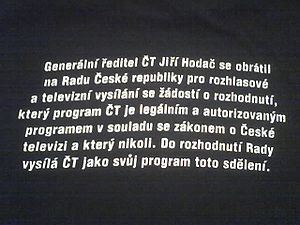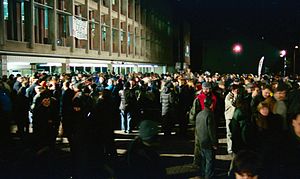- Czech TV crisis
-
The Czech TV crisis occurred at the end of 2000 and lasted until early 2001 as a battle for control of the airwaves, which included jamming and accusations of censorship. One evening during the Christmas holiday[weasel words], viewers in the Czech Republic noticed television programs were interrupted by Jana Bobošíková, a familiar face at Czech TV and the newly-appointed head of the news department, sitting next to Jiří Hodač, a former BBC employee who had been appointed general manager of Czech TV.
 The image reproduced here on a rare t-shirt appeared for a couple days on Czech Television as its only programming during the height of the crisis. It reads: General Manager of ČT Jiří Hodač has turned to the Council of the Czech Republic for Radio and Television Broadcasting with a request that it decide which programming of ČT is legal and authorized programming in accordance with the Act on Czech Television and which is not. Until the Council's decision, ČT will broadcast this statement as its programming.
The image reproduced here on a rare t-shirt appeared for a couple days on Czech Television as its only programming during the height of the crisis. It reads: General Manager of ČT Jiří Hodač has turned to the Council of the Czech Republic for Radio and Television Broadcasting with a request that it decide which programming of ČT is legal and authorized programming in accordance with the Act on Czech Television and which is not. Until the Council's decision, ČT will broadcast this statement as its programming.
During the Czech TV crisis, Czech TV reporters organized an industrial dispute by staging a sit-in and occupying the news studio and rejected attempts by Bobošíková to fire them. They were supported in their protest by politicians such as the then President Václav Havel and by Czech celebrities, but every time they tried to air their news broadcasts, Jana Bobošíková and Jiří Hodač would interrupt the transmission either with a "technical fault" screen reading: "An unauthorized signal has entered this transmitter. Broadcasting will resume in a few minutes," or with their own news broadcasts featuring Jana Bobošíková and a team she had hired to "replace" the staff members she had sought to terminate.
These broadcasts began being referred to as "Bobovize" by the disputing TV reporters and their supporters who opposed the new management. On the other hand, throughout the crisis, Bobošíková's supporters, such as Václav Klaus and the then Czech Prime Minister Miloš Zeman, accused the protesting Czech TV reporters of law infringement and claimed that those reporters who rejected the changes were not so independent after all. Železný also criticized the Czech TV reporters during his show on TV Nova, "Call the Director".
Following the "technical fault" screens and prevention of the news broadcasts by Bobošíková tens of thousands of people to marched in the streets of Prague and other Czech cities and towns, calling for restoration of freedom of the press, demanding an end to what they perceived as censorship at Czech TV. The demonstrations even drew support from a few international organizations representing reporters and made world headlines. The demonstrators also demanded Bobošíková's resignation and the dismissal of the allegedly biased general manager Jiří Hodač. Hodač was even briefly hospitalized during the events.
The Czech TV crisis eventually ended in early 2001, following the departure from Czech TV of Hodač and Bobošíková, under pressure by the street demonstration participants and at the request of the Czech Parliament, which had held an emergency session due to the crisis.
Most of the reporters who rebelled against Bobošíková are still at Czech TV today, including the current general manager Jiří Janeček, who was one of the news anchors who occupied the studio in protest. Jana Bobošíková was later hired to moderate the political discussion program Sedmička on private TV Nova. She was elected a member of the European Parliament in 2004 on Železný's ticket but split with him soon.
See also
External links
- Czech rally demands press freedom
- Analysis: The Czech TV rebellion
- Czech TV Crisis Continues – news from Czech Radio 7 (Radio Prague)
- Czech TV Crisis Continues 2 – news from Czech Radio 7 (Radio Prague)
- Mediachannel
- Made-for-TV Revolution – critical analysis in Central European Review
- TV Journalists Strike Over Political Interference – info on the IFEX pages
- ČT odmítla vysílat dokument o své krizi (CT Refused to Broadcast the Document About its Crisis) (Czech)
Categories:
Wikimedia Foundation. 2010.

